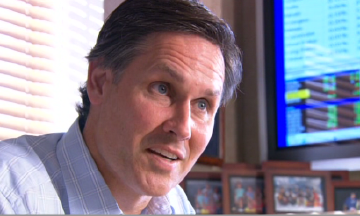Of all of the second-generation turtles, one stands out. When Salem Abraham started trading he had no prior experience with Dennis and Eckhardt, no group of like-minded turtle traders with whom to share experiences. He hadn’t worked for Goldman Sachs or for any other hedge fund. Yet it didn’t matter one iota.
With his pleasant demeanor, thick brown hair, and compact physique, Salem Abraham looks younger than his forty years. He could be mistaken for one of his ranch hands, but his Texas drawl and friendly manner mask a steely entrepreneurial drive that goes back generations. How far away was Abraham from a Wall Street pedigree? He comes from a family of Christian Lebanese immigrants who settled in rural Canadian, Texas, in 1913. His grandfather, Malouf ‘Oofie’ Abraham, sold ready-to-wear clothing out of a suitcase along the railroad before opening a retail store.
Before Abraham was headed down the path to becoming a trader, he attended Notre Dame and planned to marry his childhood sweetheart, Ruth Ann. He was going to start a mail-order business. While he did marry Ruth Ann and while he still lives in Canadian, Texas, it is not the story of his mail-order career that makes people take notice.
I first interviewed Salem Abraham face-to-face in his office in 2005. His world offers instant culture shock. Canadian, Texas, is the epitome of small-town America, but with a big twist. Abraham’s success has allowed him to endow his tiny town with amenities unusual in communities several times its size. Canadian’s Main Street (with one stoplight) now has the Cattle Exchange steakhouse and a restored movie theater with a digital sound system. Abraham has spent millions to create this oasis.
Meeting a Turtle
How was Salem Abraham able to learn about trading? He would never have pursued trading if not for a chance meeting with Jerry Parker. It was the spring of 1987. He was at Notre Dame with one semester left, determined to graduate in three and a half years in order to start his mail-order business. Then he attended a family wedding where he met Parker, and his life changed.
Abraham was making casual conversation with Parker (whose wife and Abraham shared mutual first cousins), with no expectation of a life-changing moment at hand. He asked Parker what he did for a living. Parker said, “We figure out the odds and there’s certain patterns that we look for. Then we manage our risk and when these patterns happen, you put on certain trades.” Abraham incredulously followed up, “The odds are in your favor? You’re sure of that?”
When Abraham heard the Turtle story for the first time, he was floored. He recalled, “Jerry told me about Richard Dennis and told me about these guys that he hired to train to trade. He told me that everybody’s making money and how much money they’ve made each year.” Abraham, who’d already decided he wanted to make a living in a little town in Texas, quickly said to himself, “This can work from Canadian. Its right up my alley.” At that moment he saw an opportunity, just as his grandfather had decades before when the railroad was being built.
He had never before heard of the Turtle’s or Richard Dennis, yet he took stock of Parker’s career, and without knowing the specifics, immediately shifted his goals in life to pursue trading. No more mail-order business. Luckily for Abraham, Parker said that if he ever wanted to visit Richmond he would show him some things to point him in the right direction. Abraham called the next week.
Abraham Trading Co.

No one at the Abraham Trading Company firm has an Ivy League degree. Most employees have backgrounds working at the areas feedlots or natural gas drilling companies. For example, Abraham hired Geoff Dockray as a clerk from one of those very feedlots. Dockray appreciated the opportunity to work in Abraham’s office. He said, “This beats shoveling manure at 6 a.m. in the morning. The financial markets are complicated but they’re not as relentless as dealing with livestock all the time (source: Simon Romero, A Homespun Hedge Fund, Tucked Away in Texas, New York Times, December 24, 2003).” Maybe it is that down-to-earth perspective gleaned from living in handshake country that gives Abraham a clear perspective. Sitting in the Cattle Exchange steakhouse located in the historic Moody Building, which he owns and where he has his office, he had no doubts that it is his entrepreneurial tenacity: “I think they [the winning Turtles] have a self-confidence or charisma to run a business. There’s a drive to go out and do it. Then there is a drive to want to do it. Some people [the losing Turtles] will just say, ‘Oh, hey, I made some money. That’s all I need.’ However, if you are going to boil the ocean (in other words, if you are going to use all means and options available to get something done), especially if it is a very competitive and lucrative endeavor, there will be ups and downs.”
Salem Abraham’s experience has been no different. Twice during his trading career, clients left after down or flat performance periods. He regrouped and made new equity highs each time. During trying times, he handled curve balls in his career by working on other ideas to make money. He always focused on his trading, but he also cast a wider net and caught other kinds of fish. As with trading, not everything works out.

One project was a water deal that he almost cut with billionaire T. Boone Pickens (couldn’t agree on the price). Pickens and Abraham’s ranches are right next to each other in the Texas panhandle (even though they are separated by forty miles, their ranches touch) and they have become friends over the years; Pickens was not shy about praising Abraham’s entrepreneurial guts when I talked to him in his Dallas office. There were other deals that turned out to be big winners. Abraham was humble about them: “I sold water rights to the city of Amarillo. I invested $1.5 million and I got $9 million out. I said to myself, ‘That’s a cool idea.’ Then I did the Chicago Mercantile Exchange deal [CME Initial Public Offering]. I put $1.5 million in, and got about $13 million out. You recognize opportunities where you see them.” This kind of thinking and risk-taking is how to make your first million by age twenty-five, which Abraham did.
Still, its not enough to simply spot opportunities. The confidence to act on them is mandatory. You need a killer instinct. When faced with real life and death, even with chickens and pigs, it is never easy to pull the trigger or snap a chicken’s neck, even for dinner. You have to be able to pull the trigger when there is blood on Wall Street, especially if the blood is yours (source: Jim Sogi).
Jerry Parker could not have known Salem Abraham would have the prerequisite killer instinct when they first met. Parker was probably thinking, “Okay, this young guy has got a rough idea of what I do. I’ve given him some pointers. If he’s serious, he’s going to figure it all out and just do it, but I will be surprised if he hangs around.” Unlike the original turtles who won the job lottery, who were given the exact winning rules and allowed to practice on Richard Dennis’s dime, all in the womb like atmosphere of C&D Commodities, Abraham was on his own from the get-go. He is tougher for it. There is far more to learn from the attitude and actions of this second-generation turtle than from any one original turtle.
Salem Abraham Interview
Listen to interviews with Salem Abraham here and here. And more in Michael Covel’s Trend Following classic.
